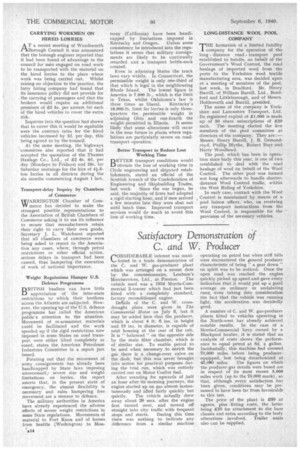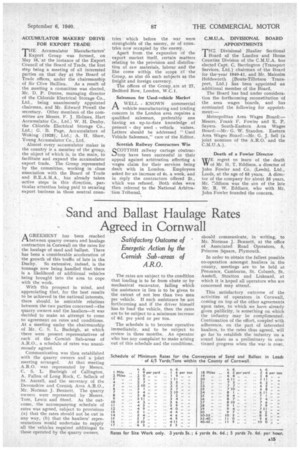CARRYING WORKMEN ON HIRED LORRIES
Page 16

Page 17

If you've noticed an error in this article please click here to report it so we can fix it.
AT a recent meeting of Wandsworth Borough Council it was announced that the borough engineer reported that it had been found of advantage to the council for men engaged on road work to be transported with the material on the hired lorries to the place where work was being carried out. Whilst raising no objection to the practice, the lorry hiring company had found that its insurance policy did not provide for the carrying of passengers and that the brokers would require an additional premium of £2 5s. per annum for each of the hired vehicles to cover the extra risk.
Inquiries into the question had shown that to cover this it would be equitable were the contract rates for the hired vehicles increased by 2d. per day. this being agreed to by the touncii.
At the same meeting, the highways 'committee also reported that it had accepted the quotation of the Thames Haulage Co., Ltd., of £2 6s, 6d. per day (Mondays to Fridays) and 25s. for Saturday mornings for the hire of 4-5ton lorries in all districts during the six months commencing August I last.
Transport-delay Inquiry by Chambers of Commerce WARRINGTON Chamber of Corn. VV merce has decided to make the strongest possible representations to the Association of British Chambers of. Commerce asking it to use its influence to secure that manufacturers retain their right to carry their own goods. Secretary J. L. Watchurst reported that all chambers of commerce were being asked to report to the Association any cases, where, through petrol restrictions or other official action, serious delays in transport had been caused, thus hampering the execution of work of national importance.
Weight .Regulations Hamper U.S. Defence Programme BRITISH hauliers can have little appreciation of the inter-state restrictions to which their brethren across the Atlantic are subjected. However, the opening up of the U.S. defence programme has called the American public's attention to the situation. Movement of re-armament materials could be facilitated and the work speeded up if the rigid restrictions now imposed in some States on road transport were either lifted completely or eased, states the American Petroleum Industries Committee in a report just issued.
Pointing out that the movement of army consignments has already been handicapped by State laws imposing unnecessarili severe size and weight limitations on lorries, the report asserts that, in the present state of emergency, the utmost flexibility is necessary and rules hampering free movement are a menace to defence.
The military authorities in America have already experienced the adverse effects of severe weight restrictions in some State regulations. Movements of material to Fort Knox and of horses from Seattle (Washington) to Mon terey (California) have been ha.ndicapped by limitations imposed in Kentucky and Oregon. Unless some consistency be introduced into the regulations it seems that military consignments are likely to be continually retarded and a transport bottle-neck created.
Even in adjoining States the truck laws vary widely. In Connecticut, the permissible weight is only one-third of that which is legal in the neighbouring Rhode Island. The lowest figure in America is 7,000 lb., which is the limit in Texas, whilst Oklahoma's law is three times as liberal. Kentucky's I8,000-lb. limit for lorries is only threequarters the permissible weight in adjoining Ohio and one-fourth the weight permitted in Illinois. It seems likely that some alterations will occur in the near future in places where regulations are particularly severe on roadtransport operation.
Better Transport to Reduce Lost Working Time
BETTER transport conditions would obviate the loss of working time in Clyde engineering and shipyard establishments, stated an official of the Scottish branch of the Confederation of Engineering and Shipbuilding Trades,
last week. Since the war began, he said, the majority of firms had adopted a rigid starting hour, and if men arrived a few minutes late they were shut out until lunch time. Improved transport services would do much to avoid this loss of working time. LONG-DISTANCE WOOL POOL COMPANY
THE formation of a limited liability company for the operation of the long distance road transport pool established to handle, on behalf of the Government's Wool Control, the road haulage of imported wool from the ports to the Yorkshire wool textile manufacturing area, was decided upon ata meeting of members of the pool, last week, in Bradford. Mr. Henry Burrill, of William Burrill, Ltd., Bradford and Littleborough, and of Messrs. Holdsworth and Burrill, presided.
The name of the company is Yorkshire and Lancashire Transport, Ltd. Its registered capital of £1,000 is made up of 50 share subscriptions of £20 each. The meeting elected the five members of the pool committee as directors of the company. They are:— Messrs. Henry Burrill, J. B. Ormondroyd, Philip Blythe, Robert Barr and Harry Woodhead.
The pool, which has been in operation since 'early this year, is one of two established to deal with the road haulage of wool on behalf of the Wool Control. The other pool was formed not long afterwards to handle shorterdistance Wool Control traffic, within the West Riding of Yorkshire.
In each case, contact with the Wool Control is maintained by means of a pool liaison officer, who, on receiving any transport instructions from the Wool Control, is responsible for the provision of the necessary vehicles. ACCUMULATOR MAKERS DRIVE FOR EXPORT TRADE
THE Accumulator Manufacturers' Export Group was formed, on May 16, at the instance of the Export Council of the Board of Trade, the first step being a meeting of all interested parties on that day at the Board of Trade offices, under the chairmanship
of Sir Clive Baillieu. As a result of the meeting a committee was elected, Mr. D. P. Dunne, managing director of the Chloride Electrical Storage Co., Ltd., being unanimously appointed chairman, and Mr. Edward Powell the secretary. Other members of the committee are Messrs. F. J. .Holmes, Hart Accumulator Co., Ltd.; W. H. Denby, the Chloride Electrical Storage Co., Ltd.; G. B. Page, Accumulators of Woking (1928), Ltd.; A. H. Shaw, Young Accumulator Co., Ltd.
Almost every accumulator maker in the country is a member of the group, the object of which is, in the main, to facilitate and expand the accumulator export trade. The Group represented by the committee, working in close association with the Board of Trade and B.E.A.M.A., has already taken active steps in this direction, particular attention being paid to securing export business in those neutral coon
tries which before the war were strongholds of the enemy, or of countries now occupied by the enemy.
Apart from the expansion of the export market itself, certain matters relating to the provision and distribution of raw materials, labour and the like come within the scope cf the Group, as also do such subjects as the freight and foreign currency.
The offices of the Group.are at 27, Bedford Row, London, W.C.I.
Salesman for Used-vehicle Market A WELL KNOWN commercial Pl vehicle manufacturing and trading concern in the London area requires a qualified salesman, preferably one having an up-to-date knowledge of present = day used vehicle values. Letters should be addressed " Used Vehicle Salesman," care of the Editor.
Scottish Railway Contractors Win
SCOTTISH railway cartage cOntractors have been successful in their appeal against arbitration affecting a wages claim for their services being dealt with in London. Employees asked for an increase of 4s. a week, and in reply the contractors offered 2s., which was refused. Both sides were then referred to the National Arbitration Tribunal.
C.M.U.A. DIVISIONAL BOARD APPOINTMENTS
THE Divisional Haulier Sectional Board of the London and Home Counties Division of the C.M.U.A, has elected Capt. C. Barrington (Transport Services, Ltd.) chairman of the Board for the-year 1940-41, and Mr. Malcolm Holdsworth (Bouts-Tillotson Transport, Ltd.) has been appointed an additional member of the Board.
The Board has had under consideration the forthcoming reconstitution of the area wages boards, and has nominated the following for appointmerit—
Metropolitan Area Wages Board:— Messrs, Frank F. Fowler and E. P. Sayers. South-Eastern Area Wages Board:—Mr: G. W. Standen. Eastern Area Wages Board:—Mr. G. J. Sell (a joint nominee of the A.R.O. and the C.M.U.A.).
Death of a Fowler Director WE regret to learn of the death IN of Mr. H. T. Eddison, a director of John Fowler and Co. (Leeds), Ltd., Leeds, at the age of 65 years. A director of the company for about 35 years, Mr. rddison was the sOn of the late Mr. R. W. Eddison, who with Mr. John Fowler founded the concern.




















































